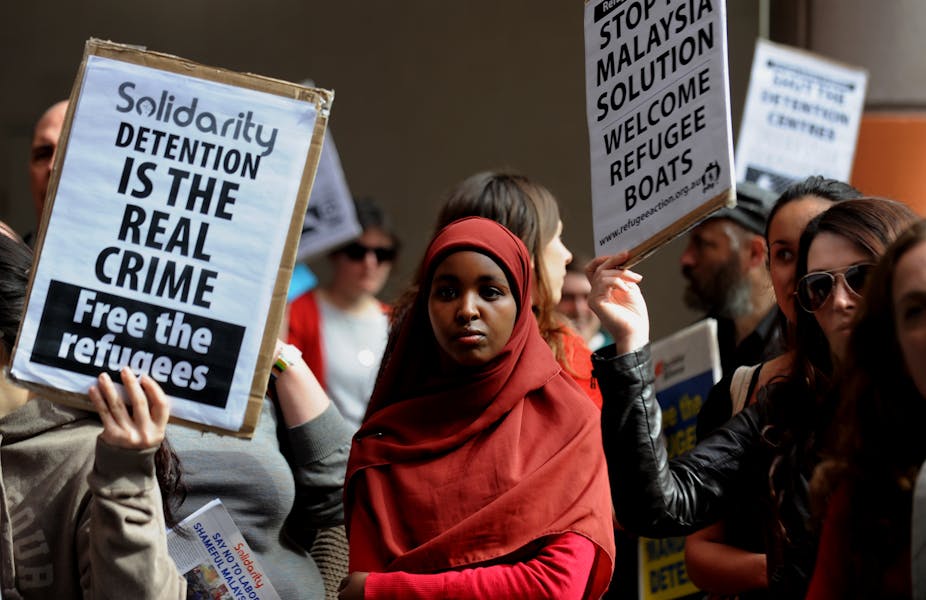The High Court’s extension of an injunction preventing the deportation of asylum seekers under the so-called Malaysian Solution threatens to present the Gillard Government with a major political problem.
Following action by refugee advocate David Manne, the Court has ruled that deportations must not take place until the full bench of the nation’s highest level of judiciary rules on the matter.
This is expected to take place no earlier than August 22.
The Conversation spoke with Monash University refugee and administrative law expert Maria O'Sullivan about the implications of the decision and what it means.
What was the initial order that has order been granted and now extended by the High Court? What part of the Malaysian refugee deal did it affect and why has it stopped the deportation of asylum seekers?
David Manne from the Refugee and Immigration Legal Centre had two main arguments. Firstly , that the declaration made by Minister for Immigration Chris Bowen should be reviewed. The declaration as I understand it tries to prevent the High Court from reviewing the legality of that declaration.
That declaration is about the human rights situation in Malaysia, whether it is sufficient to ensure the human rights of those refugees deported to Malaysia.
The second aspect is the Minister’s legal obligation under the Migration Act to act as a guardian for refugee children.
Could you explain the principle of guardianship further?
It is stated in the Migration Act that the Minister is the legal guardian of unaccompanied refugee children because they don’t have a guardian themselves. They are unaccompanied minors, people under 18 years of age.
Does that give them the same legal status as wards of the state who are Australian citizens?
I would say it is a similar legal example. In the 1950s and 60s when there was child migration from the UK to Australia that was legally criticised because the UK Home Office, should have individually given consent and signed over guardianship to the Australian authorities, but that wasn’t done in those circumstances.
There are parallels between guardianship as we know it in the general sense with orphans or wards of the state and guardianship in terms of what the Minister does. The Minister stands in the shoes of the parent if you like. Under international law he is supposed to act in the best interests of the child. That is under the UN Convention on the Rights of the Child.
Shouldn’t the Federal Government’s lawyers have forseen these challenges?
One of the problems is that this offshore processing system is seen by the Government to be outside the normal provisions of our law. But the High Court in December last year did find that you couldn’t exclude offshore persons from the Migration Act in terms of natural justice.
So you have the government trying to say that Christmas Island and the offshore processing is separate from Australian law and the High Court says that in certain circumstances, with natural justice, then you cannot exclude them from Australian law.
That is the problem: the government is saying they [asylum seekers] are not within the Australian migration territory even though they are under Australian jurisdiction.
Is this a case of the court attempting to affirm its jurisdiction?
There has always been historically a tussle between the executive and the judiciary. In 2001 the High Court read down an ouster clause which is a similar principle to the one being invoked here in relation to the review of the declaration.
Prior to 2001 the government did enact in the Migration Act a clause which limited review by the High Court and in 2001, the High Court said “No, you can’t do that. You can’t oust our constitutionally protected jurisdiction to review migration and refugee matters if there is an error of law”.
Is there a strong legal case that this will be the end of the Malaysian Solution?
I would say yes particularly with regards to unaccompanied minors. If it is meant to be a deterrent – and this is what the government says – children will then be excluded if we hold the guardianship power up. If children are excluded from that Malaysian deal then it is going to be problematic.
It is also problematic with the declaration. If the Minister has made a declaration that Malaysia is safe for people to be deported to and the High Court says that declaration has legal errors then it is going to be very difficult for the Malaysian Solution to go ahead.
There is also an argument that once Australia accepts asylum seekers into our jurisdiction, and I’m talking not about what the Migration Act says about offshore, but into our international jurisdiction, that is Christmas Island, we have accepted responsibility for them.
We can’t just send them to a third country without processing their application. If we said their application is totally without merit, it is totally unfounded and they are not refugees, then we can send them back. But the crux of the Malaysian problem is that we are not even looking at their prima facie claims.

